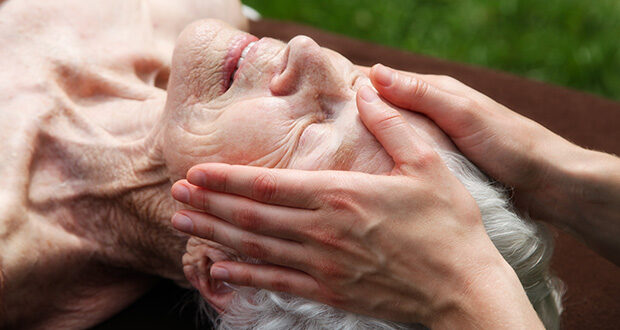More people living with the advanced stages of dementia are transitioning to residential aged care facilities as they approach the end of life.
Palliative care, aimed at improving quality of life, is primarily provided as terminal care.
But there has been limited research into models of care that seek to provide palliative care in more holistic and proactive ways.
The Namaste Care program is a non-pharmacological, psychosocial program developed for people living with advanced dementia.
A calm environment, free of distractions, is the program's key pillar. The program specifically stimulates a person's senses to promote comfort and pleasure.
Key activities include gentle face washing and moisturising, shaving the "old-fashioned way", hair combing/styling and applying makeup if desired.
Other activities include hand and foot massage, motion exercises, reminiscence, and seasonal scent interaction.
The program helps improve the quality of life for people living with advanced dementia through engagement.
The outcomes also benefit the family carers and staff through more frequent interactions during family visits and the development of a close relationship with the resident and caregiver.
A small-scale research study conducted in one aged care service in Tasmania evaluated education and training on knowledge, attitudes and self-perceived skill and competence about the trajectory of dementia using the program.
Treen Sherriff, Lifestyle Coordinator with Uniting AgeWell Kings Meadows Community, Aldersgate in Tasmania, participated in the education workshop.
"I've always dabbled in using all the senses as Namaste does, especially using music and aromatherapy," Treen said.
"When I found out we were going to have the training delivered to Uniting AgeWell, I was very excited.
"This is taking it all to the next level."
Many items used in the treatment, such as music, pillows and toiletries, snacks and drinks, are readily available within facilities.
Treen acknowledged that planning the program required a soft start, including finding that special place.
"The focus is strongly on our people living with dementia and people at the end of life, although Namaste is great for everybody," she said.
"Some of our care is delivered one-on-one in people's rooms, and we have a couple of quiet areas.
"We're just taking it as it comes but ensuring it's delivered daily to get more people on board."
Based on the education, training session, and program in action, Treen said she's enthusiastic about the benefits.
"I think every aged facility around the world should be doing it."
While the gold standard for the program recommends morning and afternoon sessions, Treen said it's not always possible.
Staff and families shared they had noticed a significant improvement in residents' quality of life.
Treen said she was pleased with the feedback.
"We're looking at expanding it as much as possible," she said.
"Every resident, whether living with dementia or not, deserves this type of care.
"But it has been especially beneficial for people living with dementia.
"It's just so important, and they look forward to it."
Enhancing the competence and confidence of staff in caring for people with advanced dementia aligns with the principles of the National Palliative Care Strategy.
The principles state that the provision of person-centred palliative care should be high quality, evidence-based and culturally appropriate.
The Aged Care Standards also require providing quality person-centred care to residents, including at end-of-life.
Building knowledge and practical skills in dementia and palliative care is essential for quality care and the returns in staff feeling valued.
"I'm delighted with my work," Treen said.
"I'm very grateful and passionate about bringing the best for everyone in aged care.
"This is their home; they deserve the best of everything and wonderful experiences.
"I get quite emotional when a reaction shows that you've done something that meant something to them."
Treen said that human touch is integral to daily life.
"It's obvious in how they react - they light up."
This interview was conducted by Dr Sara Karacsony, the Australian champion for Namaste Care International, a not-for-profit organisation that promotes the Namaste Care program, and Treen Sherriff, Lifestyle Coordinator at Uniting AgeWell Kings Meadows Community, Aldersgate residential aged care facility, Tasmania.
Do you have an idea for a story?Email [email protected]
 Aged Care Insite Australia's number one aged care news source
Aged Care Insite Australia's number one aged care news source

